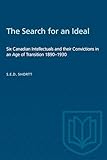The Search for an Ideal : Six Canadian Intellectuals and their Convictions in an Age of Transition 1890-1930 / S.E.D. Shortt.
Material type: TextSeries: HeritagePublisher: Toronto : University of Toronto Press, [1976]Copyright date: ©1976Description: 1 online resource (228 p.)Content type:
TextSeries: HeritagePublisher: Toronto : University of Toronto Press, [1976]Copyright date: ©1976Description: 1 online resource (228 p.)Content type: - 9780802062857
- 9781487583804
- 971.05
- online - DeGruyter
| Item type | Current library | Call number | URL | Status | Notes | Barcode | |
|---|---|---|---|---|---|---|---|
 eBook
eBook
|
Biblioteca "Angelicum" Pont. Univ. S.Tommaso d'Aquino Nuvola online | online - DeGruyter (Browse shelf(Opens below)) | Online access | Not for loan (Accesso limitato) | Accesso per gli utenti autorizzati / Access for authorized users | (dgr)9781487583804 |
Browsing Biblioteca "Angelicum" Pont. Univ. S.Tommaso d'Aquino shelves, Shelving location: Nuvola online Close shelf browser (Hides shelf browser)

|

|

|

|

|

|

|
||
| online - DeGruyter The Jewish Family : A Survey and Annotated Bibliography / | online - DeGruyter Responsible Government in Ontario / | online - DeGruyter Rions encore / | online - DeGruyter The Search for an Ideal : Six Canadian Intellectuals and their Convictions in an Age of Transition 1890-1930 / | online - DeGruyter The Office of Lieutenant-Governor : A Study in Canadian Government and Politics / | online - DeGruyter Essays on the Constitution : Aspects of Canadian law and politics / | online - DeGruyter Poverty in Canada and the United States : Overview and Annotated Bibliography / |
restricted access online access with authorization star
http://purl.org/coar/access_right/c_16ec
Within the context of the debate between idealism and empiricism, this book studies the ideas of six representative Canadian intellectuals of the late Victorian era. These six were chosen primarily because of their ideas on contemporary social questions -- views which may cast disconcerting light on certain aspects of present-day Canadian society. All were academics, and shared a common recognition of social issues and a similar self-image, yet they were hardly a homogenous group: they were individuals who expressed their own unique attitudes rather than a collective viewpoint. Sir Andrew Macphail, professor of the history of medicine at McGill, was fascinated by the social implications of evolutionary naturalism. For Archibald MacMechan, professor of English at Dalhousie, British authors of the nineteenth century provided a romantic idealism that accurately defined man's place in the universe. Another professor English, James Cappon of Queen's, built much of his thought, whether on imperialism or on literature, around a concept of culture similar to that of Matthew Arnold. Plato tempered with Christianity appeared to be a reliable philosophical guide to Maurice Hutton, professor of classics at the University of Toronto. Political economist Adam Shortt of Queen's University found much to admire in the ideas of John Stuart Mill; his counterpart at Toronto, James Mavor, borrowed many of his attitudes from British and French positivism. Each man is the subject of a chapter constituting of three parts: a biographical section, a consideration of the essential core of his belief -- his view of man, God, and the universe -- and an examination of how his background and philosophy fround express in his ideas about culture and society. No attempt is made to document the influence of the ideas of these academics for, as they themselves asserted, they were essentially moralists, not men of action.
Mode of access: Internet via World Wide Web.
In English.
Description based on online resource; title from PDF title page (publisher's Web site, viewed 01. Nov 2023)


